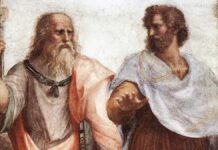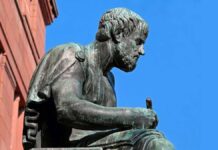Rainer Maria Rilke’s poem Adam delves into the mythological and existential dimensions of the biblical figure Adam, exploring themes of creation, solitude, guilt, and the human condition. Through evocative imagery and profound introspection, Rilke portrays Adam not merely as the first man but as a universal symbol of humanity’s struggle with its origins, identity, and moral consciousness.
The poem begins with Adam as a monumental and solitary figure, embodying the profound isolation of being the first human. He exists in a primordial world, surrounded by the vastness of creation yet fundamentally alone. This solitude is not just physical but spiritual and existential, highlighting the weight of his unique position as the progenitor of humankind.
Rilke’s portrayal of Adam moves beyond the simplistic biblical narrative of sin and punishment. Instead, Adam is depicted as a deeply introspective being, burdened by the knowledge of his own disobedience and its consequences. The act of eating the forbidden fruit becomes not merely an act of rebellion but a moment of profound transformation —an awakening to self-awareness and moral responsibility. Adam’s guilt is not just personal but cosmic, as he becomes painfully aware of the rift between humanity and the divine.
The poem captures Adam’s anguish as he grapples with his fall from grace. His connection with nature is severed, and he becomes alienated from the paradisiacal world that once embraced him. Yet, amidst this alienation, there is a sense of tragic dignity in Adam’s plight. He becomes a symbol of humanity’s dual nature —capable of great understanding and reflection yet burdened by its flaws and limitations.
Rilke’s Adam embodies the existential struggle of all human beings, torn between the desire for transcendence and the weight of their earthly existence. The poem does not offer resolution or redemption; instead, it leaves Adam suspended in a state of profound reflection, inviting readers to contemplate their own place in the cosmos and their relationship with creation and divinity.
Themes of Solitude and Isolation
One of the central themes of Adam is solitude. As the first man, Adam experiences a unique form of isolation—being the only human in a vast, newly created world. Rilke amplifies this theme to reflect the broader human experience of existential solitude. Adam’s isolation is not just physical but spiritual, highlighting humanity’s fundamental alienation in the universe. His plight resonates with readers, as it mirrors the universal struggle to find meaning and connection in a vast and indifferent cosmos.
Existential and Philosophical Undertones
Rilke’s Adam transcends the biblical narrative, embedding existential and philosophical questions within the poem. The forbidden fruit symbolises disobedience and the awakening of self-awareness and moral consciousness. Adam’s fall is depicted as the birth of human individuality, marking the beginning of humanity’s struggle with freedom, guilt, and responsibility. Rilke invites readers to reflect on the human condition—our capacity for understanding, our flaws, and the burden of self-awareness.
Symbolism and Imagery
Rilke employs powerful symbolism and evocative imagery throughout the poem. Adam is portrayed as a monumental figure, embodying the weight of creation. The imagery of nature —lush and harmonious before the fall —contrasts with Adam’s alienation after his transgression. The forbidden fruit becomes a symbol of knowledge and its double-edged nature, bringing enlightenment but also suffering. Rilke’s language evokes a sense of grandeur and tragedy, elevating Adam’s story to a universal parable.
Psychological Depth
The poem delves deeply into Adam’s psyche, presenting him as a complex and introspective figure. Rilke’s Adam is not merely a biblical archetype but a deeply human character struggling with guilt, self-awareness, and his relationship with the divine. His anguish and reflection make him relatable, as he embodies the universal human experience of grappling with identity and moral responsibility.
Structure and Style
Rilke’s poetic style is characterised by its lyrical quality and philosophical depth. The structure of the poem mirrors Adam’s journey, moving from the serenity of creation to the turmoil of self-awareness and guilt. The language is rich and evocative, filled with metaphors and symbols that invite multiple interpretations. Rilke’s use of free verse allows for a fluid and organic exploration of Adam’s thoughts and emotions, creating a sense of intimacy and immediacy.
Reinterpretation of Biblical Myth
Rilke’s Adam is a reinterpretation of the biblical myth, offering a more nuanced and humanised portrayal of the first man. While the traditional narrative focuses on sin and punishment, Rilke emphasises Adam’s introspection and the existential consequences of his actions. This reinterpretation aligns with modern existential thought, presenting Adam’s fall as a necessary step in the evolution of human consciousness and individuality.
Emotional Resonance
The poem evokes a deep sense of empathy for Adam, capturing the pathos of his situation. His isolation, guilt, and alienation resonate with readers, reflecting their own struggles with identity and meaning. The emotional depth of the poem enhances its universality, making Adam not just a religious figure but a symbol of the human experience.
Rainer Maria Rilke’s Adam is a profound meditation on the human condition, exploring themes of solitude, guilt, self-awareness, and the quest for meaning. Through rich imagery, philosophical depth, and emotional resonance, Rilke reimagines the biblical figure of Adam as a universal symbol of humanity’s struggles and aspirations. The poem invites readers to reflect on their existence, their relationship with the divine, and the burdens and gifts of self-awareness, making it a timeless and deeply impactful work of literature.

























